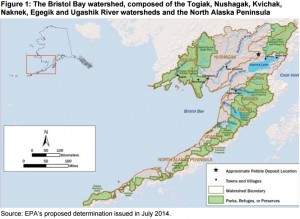 WASHINGTON – The Office of Inspector General (OIG) for the U.S. Environmental Protection Agency (EPA) today issued its report concluding a review of the agency’s actions and decision to conduct an assessment of Alaska’s Bristol Bay watershed. While the OIG found neither evidence of bias nor a pre-determined outcome on the EPA’s part, it noted that an EPA employee may have misused his position by providing, through a personal non-governmental email account, comments on a Clean Water Act Section 404(c) petition drafted by six Alaska Native tribes before the tribes submitted the petition to the EPA.
WASHINGTON – The Office of Inspector General (OIG) for the U.S. Environmental Protection Agency (EPA) today issued its report concluding a review of the agency’s actions and decision to conduct an assessment of Alaska’s Bristol Bay watershed. While the OIG found neither evidence of bias nor a pre-determined outcome on the EPA’s part, it noted that an EPA employee may have misused his position by providing, through a personal non-governmental email account, comments on a Clean Water Act Section 404(c) petition drafted by six Alaska Native tribes before the tribes submitted the petition to the EPA.
“Multiple hotline complaints and congressional inquiries prompted the Office of Inspector General to conduct this program evaluation,” said Inspector General Arthur A. Elkins. “Our report constitutes an independent determination as to whether the EPA adhered to laws, regulations, policies and procedures in developing its assessment of potential mining impacts on ecosystems in Bristol Bay.”
By way of background, the Bristol Bay watershed in southwestern Alaska is home to 25 federally recognized tribal governments, and contains large amounts of copper and gold. The EPA conducted its watershed assessment from February 2011 to January 2014 to determine the significance of Bristol Bay’s ecological resources and evaluate the potential impacts of large-scale mining on those resources.[xyz-ihs snippet=”adsense-body-ad”]
The OIG found that the EPA’s assessment appropriately included sections on three primary phases discussed in the agency’s ecological risk assessment guidelines. The EPA also met requirements for peer review, provided for public involvement throughout the peer review process, and followed procedures for reviewing and verifying the quality of information in the assessment before releasing it to the public.
The EPA employee discussed in the report was an ecologist responsible, at a staff level, for implementing and overseeing Clean Water Act provisions for portions of Alaska, as well as one of 20 authors of, and an EPA technical lead for, the agency’s assessment. Whether his actions resulted in an actual misuse of position under the Standards of Ethical Conduct for Employees of the Executive Branch depends on other considerations that the OIG was unable to discern. However, the EPA’s Senior Counsel for Ethics agreed with the OIG’s determination of possible misuse, as agency employees must remain impartial in dealings with outside parties, particularly those that are considering petitioning or have petitioned the agency to take action on a matter. The employee retired from the EPA in April 2013.
The OIG’s evaluation was limited by an inability to obtain all government emails for the retired employee. The EPA identified 25 months of missing emails for the retired employee. As a result, the OIG was unable to draw any specific conclusions related to that employee’s government emails during that period. The OIG also attempted to obtain access to the retired employee’s personal email records regarding Bristol Bay activities because it found that the employee had used personal email to review the draft tribal petition. The employee’s legal counsel refused service of a subpoena, stating that she was not authorized to accept service on behalf of her client.
For more information, read the [report] and listen to a [podcast] about it.
The OIG is an independent office within the EPA that performs audits, program evaluations and investigations of the EPA and the U.S. Chemical Safety and Hazard Investigation Board, and their contractors, and prevents and detects fraud, waste and abuse. By helping the EPA and CSB operate more economically, effectively and efficiently, the OIG contributes to improved environmental quality and human health. The OIG strives to provide solutions to problems that ultimately result in making America a cleaner and healthier place. For more information, visit https://www.epa.gov/oig and follow the OIG on Twitter at @EPAoig (https://twitter.com/EPAoig).[xyz-ihs snippet=”Adversal-468×60″]
